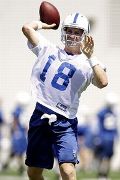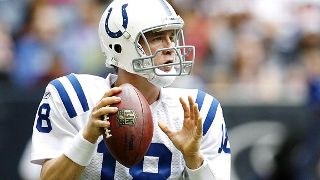|
INDIANAPOLIS -- His neck is repaired and he’s been working with receivers since April. Now he’s leading the Indianapolis Colts through minicamp paces, intent on a return to the Super Bowl and a better big-game result. How does Peyton Manning, the league’s first four-time MVP, get better for 2010? Head coach Jim Caldwell has seen the process up close as a participant. He knows just the sort of meticulous deconstruction of the 2009 season Manning has done with quarterback coach Frank Reich in search of bullet points to concentrate on for 2010. “He’s a very unusual guy,” Caldwell said. “Every year he kind of goes through this process where he and Frank will sit down and they’ll take a look at what he was able to accomplish last year, he’ll look at all his strengths and weaknesses. He’ll review every single snap of every game he played. And not just glancing over it, but I’m talking about detail. They’ll take notes of ever single throw, every single play call, every single check. “And then from that he’ll go through it and then make a determination on where he thought he could improve on that setting. He’ll dissect his entire season that way and then he’ll set new goals for himself in terms of what he thinks he can accomplish. And he seems to certainly keep moving forward, each and every year you see he gets better… I don’t think there is any limitation on him, on what he can improve upon.” How long does it take? A week? A couple? “Months,” Caldwell said. “Plural.” That’s not talk from Caldwell the rest of the NFL will be excited to hear, but it’s hardly surprising. Saying Manning is meticulous is akin to saying Santa Claus is overweight. Still, we don’t frequently get details of just how Manning goes about things, just like we don’t get readings from a scale at the North Pole. I asked Caldwell about avenues for Manning to improve upon after Manning spoke at the media center podium at team headquarters Friday. I certainly wish I were getting the scoop from Manning. But odds are Manning, who’s super savvy with the media but not a big sharer with stuff that could ever qualify as state secrets, wouldn’t have offered much up on it anyway.  A lot of offseason morning meetings start at 7 a.m., he said, while suggesting his timing with pass-catchers always will be a big point of emphasis in this offense. A lot of offseason morning meetings start at 7 a.m., he said, while suggesting his timing with pass-catchers always will be a big point of emphasis in this offense.
“The main thing I try to work on is the timing with these new receivers, Brody [Eldridge] who’s a new tight end here, Sam Giguere who’s healthy and obviously try to get even more sound with Pierre [Garcon], [Austin] Collie,” Manning said. “And everybody acts like this is the start. We’ve been here since April, we’ve been throwing. We’ve been working a lot on the field. “I’ve had another good offseason with [Anthony] Gonzalez now that he’s back. Getting the timing down with all these young receivers, the more I can get on the same page with them the more we have a better chance at success.” Clyde Christensen is the offensive coordinator now, with Tom Moore in a lesser role. Manning has worked closely with Christensen in recent years. He’s been the coach who has been in charge of third-down situations and red zone plays, two excellent areas for the Colts. While some players will need to adjust to the change in coordinators, the switch won’t slow Manning down at all. At minicamp practice, Manning looked like Manning. In a breeze that was occasionally strong, the throws were crisp and precise whether the target was Dallas Clark or Dudley Guice. The quarterback’s conversations with a coach or player to the side during breaks were accented with points and hand gestures about patterns and positioning. I’d never expect that Manning would decide he’s got it all under control. But I do suspect it can get increasingly hard for very good players in any sport to find macro-issues to target this time of year. That’s why it’s so great when we learn that Kobe Bryant spent offseason time with Hakeem Olajuwon to become a better player in the post, and why details from Caldwell on Manning’s determination to be more accurate can be pretty interesting. Before 2008, Manning’s tear-down of 2007 led him to a more intense focus on pass placement, according to Caldwell, who was the assistant working most closely with him then. So what did that lead to? “He works each and every drill in terms of placing the ball where he wants to place it and if he doesn’t hit it right on the spot, he’ll say, ‘Hey, let’s do that one again,’” Caldwell said. “He’ll repeat it. And for most people, the initial pass would have been one that would have been highly acceptable. “But for him, it maybe wasn’t right on the pinpoint of the left shoulder. Or maybe it wasn’t at the right ear. He’s very, very precise in that regard, and I think that’s what makes him unusual.” Anything Manning has discovered since then has also been layered into his private individual work with targets and sessions like today’s. Reggie Wayne is absent in a contract protest. Upon his return, the group of Wayne, Garcon, Collie and Gonzalez gives the team a “chance to be as deep as ever” at the position, Manning said. The draft class is supplemented by the return of Gonzalez and safety Bob Sanders from injury -- players Manning feels almost qualify as free-agent additions. Given those factors, the Colts seem like they’ll be in position to improve as they try to defend their AFC title. But Manning emphasizes they’ve got to do the things to make it so, not rely on how it all looks on paper. Notes from his season breakdown are on paper, too. It’s hard to imagine they won’t come to life on fall Sundays. “He’s got such great presence of mind, such great will and determination that I think you will see him improve in almost every area,” Caldwell said.
|

